Uncategorized
-
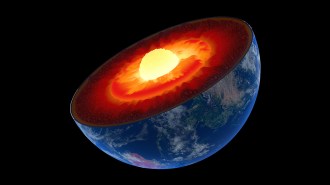 Earth
EarthSomething weird is happening to Earth’s inner core
A new study claims to confirm that the inner core is now rotating more slowly than it was over a decade ago, but some researchers remain skeptical.
By Nikk Ogasa -
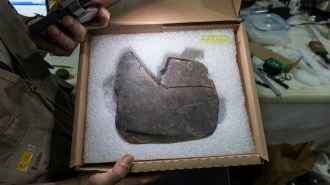 Archaeology
ArchaeologyA lost civilization’s partial alphabet was discovered in a social media post
In online images of an ancient tablet, an expert spotted previously unnoticed letters — a partial alphabet from the Tartessian civilization.
-
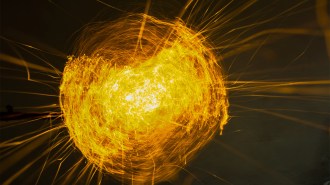 Physics
PhysicsA black hole made from pure light is impossible, thanks to quantum physics
A “kugelblitz” is a black hole made of concentrated electromagnetic energy. But it’s not possible to make one, according to new calculations.
-
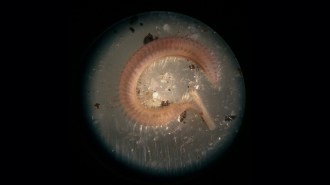 Animals
AnimalsBeneficial bacteria help these marine worms survive extreme cold
Three species of marine worms living in Antarctic waters have beneficial relationships with bacteria that produce antifreeze proteins.
-
 Archaeology
ArchaeologyA new study challenges the idea that Rapa Nui islanders caused an ‘ecocide’
Rapa Niu islanders farmed and fished enough to feed only a few thousand people, too few to decimate society before Europeans arrived, researchers contend.
By Bruce Bower -
 Climate
ClimateA heat dome is baking the United States. Here’s why that’s so dangerous
As climate change makes heat waves more frequent and intense, older adults, pregnant people and others are at higher risk for heat-related symptoms.
-
 Neuroscience
NeurosciencePain may take different pathways in men and women
Sex differences in the function of nerve cells in mice, monkeys and humans suggest a new way to treat pain conditions.
By Claire Yuan -
 Animals
AnimalsCan leeches leap? New video may help answer that debate
For some, it’s the stuff of nightmares. But a grad student’s serendipitous cell phone video might resolve a long-running debate over leech acrobatics.
By Susan Milius -
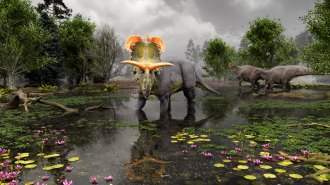 Paleontology
PaleontologyMeet Lokiceratops, a newly discovered species of horned dinosaur
Found in Montana’s badlands, Lokiceratops had two large, bladelike horns jutting forward and out from between its eyes.
-
 Space
SpaceAstronomers watch a supermassive black hole turn on for the first time
A galaxy transitioned from being dim and quiet to bright and active, giving astronomers insight into active galactic nuclei.
By Adam Mann -
 Science & Society
Science & Society‘After 1177 B.C.’ describes how societies fared when the Bronze Age ended
Archaeologist Eric H. Cline’s new book reconstructs ancient examples of societal resilience and fragility that have modern-day relevance.
By Bruce Bower -
 Earth
Earth50 years ago, the sun’s influence on Earth’s lightning was revealed
The solar wind and sunspots seem to give lightning a boost. But exactly how solar activity stimulates strikes is an enduring mystery.